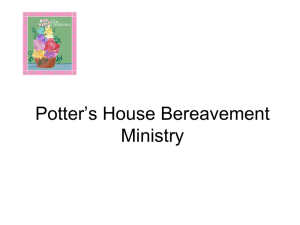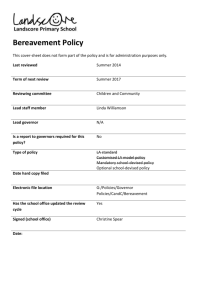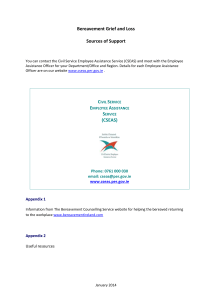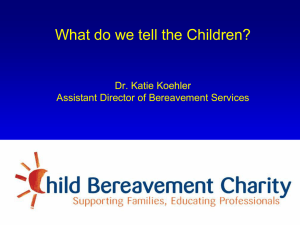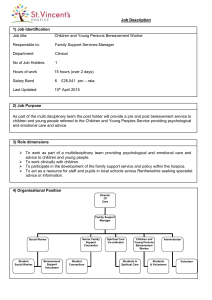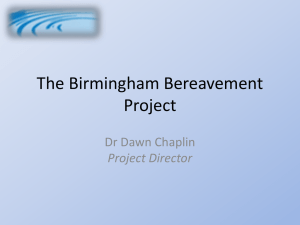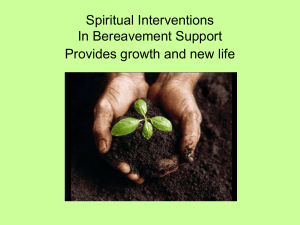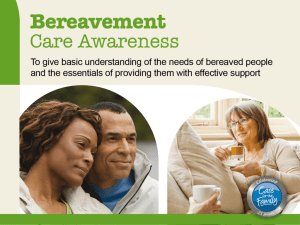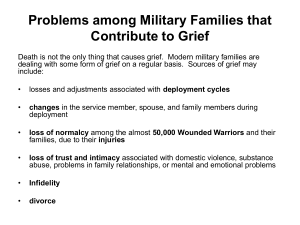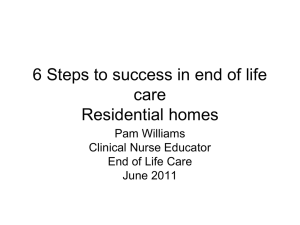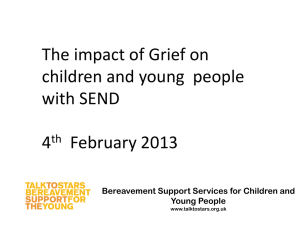Responding to the needs of families and carers
advertisement
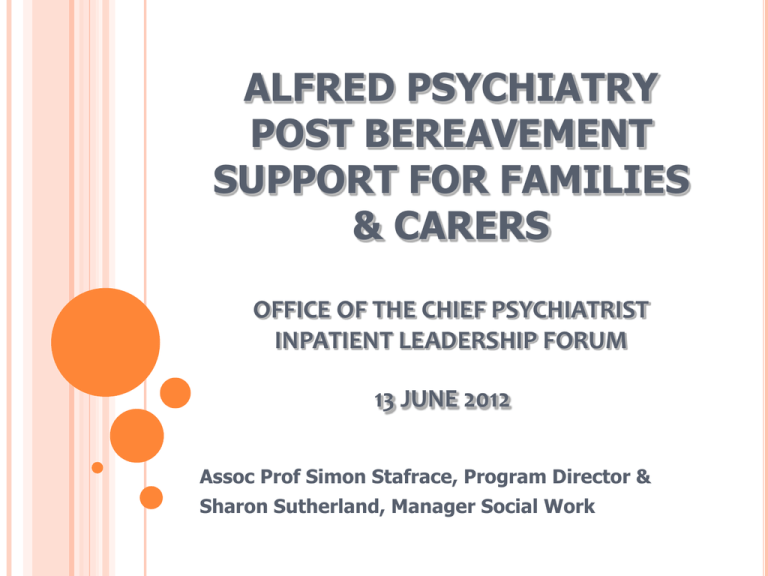
ALFRED PSYCHIATRY POST BEREAVEMENT SUPPORT FOR FAMILIES & CARERS OFFICE OF THE CHIEF PSYCHIATRIST INPATIENT LEADERSHIP FORUM 13 JUNE 2012 Assoc Prof Simon Stafrace, Program Director & Sharon Sutherland, Manager Social Work Outline Why? Purpose & Principles Process- 8 steps Experience to date Discussion & Reflection WORKING WITH FAMILIES & CARERS FAMILY PARTICIPATION IS EMBEDDED IN VICTORIAN MH POLICY & LAW Families and carers should be recognised, respected and supported as partners in providing care to the consumer. Families and carers should be engaged as early as possible in the episode of treatment and care Victoria’s Mental Health Act working with families integral to the provision of good mental health care. 7/04/2015 Ψ WORKING WITH FAMILIES & CARERS …….SHOULD CONTINUE AFTER SUDDEN & UNEXPECTED DEATH WHEN MH CONSUMERS DIE SUDDENLY & UNEXPECTEDLY Working with families affected challenging for MH clinicians Difficult emotional states- Anger, Guilt, Blame, Grief Clinicians find themselves in an ambiguous position Are we blamed for the death? Do we re- traumatize families by our presence? Will our offers of assistance be rejected? Open disclosure vrs the fear of liability What of the long-term? It can be all too hard…….. WHEN MH CONSUMERS DIE SUDDENLY & UNEXPECTEDLY Information and support after suicide help family and friends cope can aid the process of bereavement People bereaved by suicide at higher risk of Abnormal grief Depression Suicide 7/04/2015 Ψ WHEN MH CONSUMERS DIE SUDDENLY & UNEXPECTEDLY Literature on how to assist bereaved persons and groups has grown extensively over the past two decades includes guidelines for clinical caregivers (Rando,1984) proposals for helping children (Wass & Corr, 1984), strategies for assisting adolescents (Corr & Balk, 1996), Guidance for work with specific populations (Quint Benoliel,1999) Ψ 7/04/2015 Ψ PURPOSE & PRINCIPLES PURPOSE To describe the process by which families & carers will be supported after the sudden & unexpected death of a loved one who is a registered client at the time of death To identify individuals within the service who can provide post-bereavement support and facilitate access to external resources Maintain a minimum standard of post bereavement follow up & care Allow adaptations for needs of individual families, according to developmental, cultural and religious requirements 7/04/2015 Ψ PRINCIPLES Families will be supported to access internal and external supports following bereavement Families will be provided with information about the care of the family member prior to his/her death (Open Disclosure) Families will be offered choices should formal support postbereavement be requested Ψ 7/04/2015 PROCESS OUTLINE 1. 2. 3. 4. 5. 6. 7. 8. Immediate response & notification Responsibility for reporting Identifying the Post Bereavement Support Person The Role of the Post Bereavement Support Person The Framework of Support Coordination, supervision and governance Other considerations post-bereavement External Resources and Services ς 7/04/2015 1. IMMEDIATE RESPONSE & NOTIFICATION Post bereavement contact with the family should be immediate and not delayed by the need to identify the Post Bereavement Support Person (PBSP). The regular treating Consulting Psychiatrist or clinician will make contact with the family/identified next of kin as soon as possible following a patient’s death Condolences, regret Share information Explain processes of review. If AH & death in IPU, the On-Call Seniors assume this role The SW Manager will be contacted the next business day in order to ensure implementation of the Post-Bereavement Support Response 7/04/2015 ς 1. IMMEDIATE RESPONSE & NOTIFICATION If death occurs in a bed-based service, reception of the family must be coordinated by the most senior staff available. Attention to How information is shared The handling of the deceased patient’s personal belongings Families offered the opportunity to pack the patient’s belongings (issues if on acute IPU vrs residential setting) 2. RESPONSIBILITY FOR REPORTING It is the responsibility of the Program Manager involved to: Report the death and family and carer contact in Riskman. Notify the SW Manager All contact with the family is documented in the consumer history. ς 7/04/2015 3. IDENTIFYING THE POST BEREAVEMENT SUPPORT PERSON The SW Manager will identify the PBSP, in consultation with the Program Manager & treating Psychiatrist Factors to consider in the provision of bereavement support include: Staff experience and skill in bereavement counselling; Level of engagement with the family; and Expressed wishes of the family; Circumstances of the care and death of the patient. ς 4. THE ROLE OF THE POST BEREAVEMENT SUPPORT PERSON Support the family in the post bereavement process Engage in a therapeutic alliance Be the key contact and communicator between the organisation and the family Advocate for the family Ensure access to appropriate health service and community supports ς 7/04/2015 5. FRAMEWORK OF SUPPORT Follow up will be offered for up to 12 months Multi-modal Letters Telephone calls, Face-to-face, Written information Social- eg. invitation to attend annual Alfred Health Family Memorial Service ς 7/04/2015 5. FRAMEWORK OF SUPPORT Involves counselling Short to medium term Supportive Separate to but may include support during feedback about internal critical incident review Information about resources Referral to external agencies, local GP, etc Repeated contact at intervals within one week of a death @6 weeks @ 3 months @ 12 months of the death. ς 7/04/2015 5. FRAMEWORK OF SUPPORT Collaborative The nature and frequency of the contact will be decided in consultation with the family and include a range of therapeutic interventions and approaches External partnerships Poorly developed External agencies may be more appropriate ς 7/04/2015 6. CO-ORDINATION, SUPERVISION AND GOVERNANCE The Social Work Manager will Be responsible for the coordination of the protocol Appoint the PBSP in consultation with the Program Manager & Treating Psychiatrist Supervise the PBSP Audit, evaluate the process, seeking family feedback into the process Review the guidelines annually Report to the Family and Carer Committee ς 7/04/2015 7. OTHER CONSIDERATIONS Ψ SUPPORTING STAFF Education, training and specialist supervision to be provided (ASIST,SANE) May include access to specialist grief and loss services to provide additional peer support for selected staff initially Staff should have the have the opportunity to talk about the suicide and participate in debriefing. ς 7/04/2015 SUPPORTING CHILDREN & YOUTH Concerns about the mental health of bereaved friends or family The mental health needs of children and youth may require specialist secondary consultation or specialist assessment at CYMHS. ς 7/04/2015 MEDICO-LEGAL ISSUES The coronial process following a suicide Families will usually have contact with the coroner’s court. Every state and territory has coronial services that offer some form of support to people who have experienced the traumatic death of someone close. Collaboration with this service may be helpful Medico-legal issues -may need to seek a legal opinion Confidentiality considerations create complexity surrounding disclosure without consent or advanced directives 7/04/2015 ς 8. EXTERNAL RESOURCES Ψ EXTERNAL BEREAVEMENT REFERRAL SERVICES Should families and carers decide to access external bereavement support the following services are available: 24-hour crisis telephone counselling – Lifeline: 13 11 14 Australian Centre for Grief and Bereavement – 1300 664 786 24 Hour Loss and Grief support line Free call 1800 641 091 Jesuit Services suicide help line -039427-9899 ς 7/04/2015 EXTERNAL BEREAVEMENT REFERRAL SERVICES Compassionate Friends Hot line-(03) 9888 4034 24 Hour Grief Support Phone: 03 9888 4944 Freecall:1800 641 091Fax : 03 9888 4900 Salvation Army Help Line – 1300 467 354 SANE Helpline – 1800 18 sane (7263); helpline@sane.org Suicide Call-Back Service – 1300 659 467 The Bereavement Counselling and Support Service (03) 9265 2111, fax (03) 9265 2150 or email counselling@grief.org.au National Missing Persons Coordination Centre – 1800 000 634 ς 7/04/2015 ON LINE RESOURCES www.grief.org.au www.compassionatefriendsvictoria.org.au www.lifeline.org.au www.supportaftersuicide.org.au www.missingpersons.org.au www.nalag.org.au www.sane.org www.copmi.net.au www.siblingsgrief.org.au www.beyondblue.org.au www.blackdoginstitute.org.au www.kidshelpline.com.au 7/04/2015 THE EXPERIENCE OF POSTBEREAVEMENT SUPPORT 2012 Ψ OBSERVATIONS Communication has been prompt The protocol has been adaptable to different settings and family needs across the service. High level engagement esp. in youth service 7/04/2015 Strengths Limitations Notification indirect via senior managers Partnerships with complementary organizations have not been formalized Families in adult services have not engaged directly in short term Ψ FURTHER CONSIDERATIONS What do families want/need from our services in the post-bereavement phase? Should we engage a regular bereavement team or appoint individuals on a case by case basis? Are social workers best placed to provide this support? What are the key competencies in this area of service delivery and how do we select staff? Should we focus our efforts on developing partnerships with external agencies? How do we establish reliably what these agencies actually provide? 7/04/2015 Ψ A REFLECTION Families were identified in each case Are families EVER indifferent to the suffering of their children Do we consider the degree to which TRAUMA drives disengagement? Can this change how we think about family engagement in active clients? 7/04/2015 Ψ
